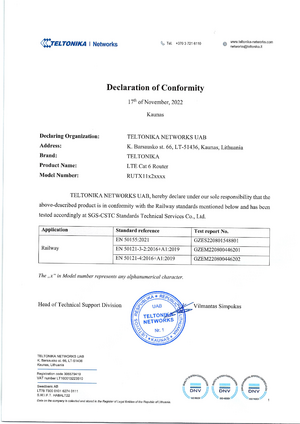RUTX11 Railway: Difference between revisions
(Created page with "{{Template: Networking_device_certification_railway | name = RUTX11 | file_img = 508486 Declaration of Conformity RUTX11-001.png | link_img = Special:Redirect/file/508486...") |
m (Protected "RUTX11 Railway" ([Edit=Allow only administrators] (indefinite) [Move=Allow only administrators] (indefinite))) |
(No difference)
| |
Revision as of 08:24, 18 November 2022
Main Page > RUTX Routers > RUTX11 > RUTX11 Certification & Approvals > RUTX11 Railway
Description
Rail transport is a key element in the establishment of a sustainable infrastructure system. Teltonika offers a connectivity solution for railway transportation featuring the RUTX11, delivering fast and reliable on-board communications.
Attachments
RUTX11 devices are certified for Railway use and tested accordingly:
 |
To download a PDF version of the declaration, click here.
| Standard reference | Details |
|---|---|
| EN 50155:2021 | Railway applications. Rolling stock. Electronic equipment |
| EN 50121-3-2:2016+A1:2019 | Railway applications - Electromagnetic compatibility - Part 3-2: Rolling stock - Apparatus |
| EN 50121-4:2016+A1:2019 | Railway applications - Electromagnetic compatibility - Part 4: Emission and immunity of the signalling and telecommunications apparatus |
| EN 61373:2010 (Category 1, Class B) | Railway applications - Rolling stock equipment - Shock and vibration tests. Category 1 means the device should be Body mounted, while Class B states it is mounted inside an equipment case which is in turn mounted directly on or under the car body |
| EN 45545-2:2020 (HL3) | Railway applications - Fire protection on railway vehicles - Part 2: Requirements for fire behavior of materials and components. HL is the level of hazard to differentiate material fire safety requirements derived from Operation and Design Categories |
| EN 45545-2:2020 (R25) | Railway applications - Fire protection on railway vehicles - Part 2: Requirements for fire behavior of materials and components. Products are classified according to 26 requirement sets (R1-R26) depending on where the materials are used. Each requirement has a corresponding series of test performance criteria |
